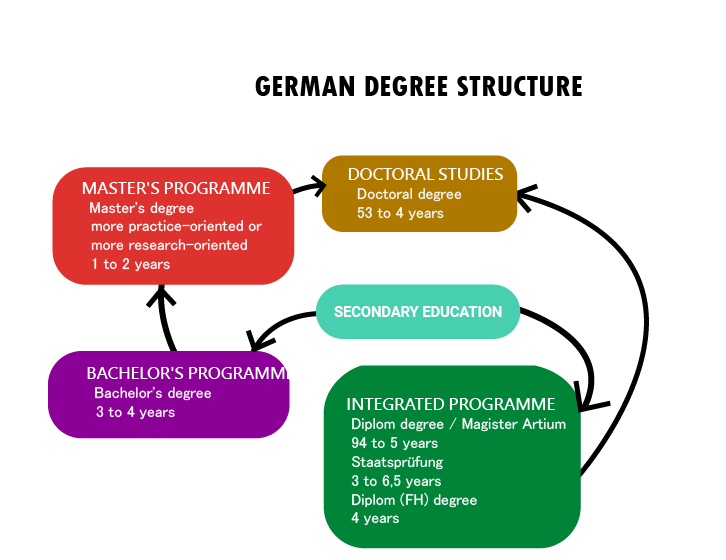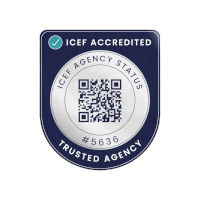Quick Enquiry
Germany is the ideal destination to study abroad: World-class education, exciting urban life embedded in beautiful landscapes, and a welcoming culture with people from all over the globe.
Facts About Germany
- Name : Federal Republic of Germany (Bundesrepublik Deutschland).
- Official Language : German.
- Currency : Euro.
- Capital : Berlin.
- German Population :83,305,000 ( 2020 est.).
- Religion : Roman Catholic 29%, Protestants 27% Orthodox Christian 1.9, Muslim 4.4%, unaffiliated or other 37.7%.
Why Study in Germany
- Safe country to live and study.
- Wide range of courses on offer.
- Excellence in research and teaching.
- Study programs taught in English.
- Close link between theory and practical.
- Lowest tuitions fees.
- Affordable living expenses.
- Foreign students are allowed to stay for one and half years after graduation.
- Great job opportunities.
- International students are allowed to work during their study.
- Besides studying, live and explore one of the most developed countries and its culture.
German Visa holders can move freely across the EU’ national borders without the need for a separate visa or passport
German Education System
Universities in Germany are classified into 3 different categories:
- Universities.
- Universities of Applied Sciences.
- Technical, Music, Arts and Film colleges.

Tuition Fees & Living Cost
- A public university- from no fees to 50 to 800 euro/ sem.
- Private universities- 4500 euro to 7000 euro/ sem.
Following details are just average amounts. This can go high or low depending on the city you live in and how you manage
- Room rent – 450 euros/month.
- Insurance – 150 euros.
- Radio/ tv contribution – 20 euros.
- Internet/ other costs – 15 euros.
- Food – 150 euros.
- Clothing – 60 euros.
Intakes
- Summer- March/ April.
- Winter- September/October.
- certain private universities - February/May/June in addition to above intakes.
Documents Required for Admission
- Schooling certificate [ 10th and 12th ].
- Bachelor degree certificates with consolidated semester mark sheets.
- Statement Of Purpose(SOP)/ Motivation letter.
- Proof of English language efficiency like IELTS/TOEFL/ with scores not less than 6.5 or 90 respectively or Medium of Instruction Certificate from college or University.
- Passport Copy.
- Updated CV.
- Recommendation letters from your professors.
- Work experience certificates if you have any.
“If you have taken other exams such as GRE/GMAT, etc., you can submit documentation of those as well. This will help the university to properly assess your abilities”.
Work Rights and Stay Back
- 240 days part time or 120 days full time in a year .Students can work for more hours subject to approval from foreign authority.
- 18 months stay back ( one and half Year).
- 20 hr/week(during class timings).
- 40 hr/week (vacations).
How to Apply for Germany Student Visa
If you want to study in Germany, you have to apply for a German national visa. You have to submit the documents directly at the consulate or vfs. You will have to attend an interview at the consulate or vfs, followed by the application.
Checklist For German Student visa
- Valid passport (issued within the last 10 years and valid for at least another year as of date of visa application; passports with observations regarding the front data page cannot be accepted) with at least two empty pages.
- 3 passport pictures according to biometric specifications, not older than 6 months.
- Application form & declaration (in accordance with Section 54 of the Residence Act) duly signed.
- Declaration for Additional contact and legal representation information.
- Copy of your passport’s data page (A4 size copy).
- Personal covering letter explaining the exact purpose and duration of stay.
- Proof of admittance to the study course/preparatory college including information on the language of instruction.
- Where not confirmed by the University in the admission notification: Proof of the language skills in the language of instruction for the study course or the preparatory course (without a preparatory language course as a rule at least B2-level in the language of instructions).
- Where applicable: Certificates of other academic qualifications.
- Curriculum vitae.
- Letter of motivation.
- Proof of financial means to cover the costs for the time of your studies by one of the following documents:
1.confirmation of a German / EU scholarship / stipend or
2.formal obligation letter by sponsor living in Germany or
3.blocked account for the first year of your stay, amounting to 11,904-- €.
- Travel health insurance.
You need not know German if you intend on enrolling in an international degree programme which would be taught in English. However, it is recommended that you learn German language at the earliest as it will help improve social acceptability and will be an added advantage in getting part time jobs while studying and full time jobs on completing the course.
Yes, There’s plenty of International Degree Courses taught in English
There are around 400 institutions of higher education in Germany comprising of a combination of state funded and private universities as well as private colleges. One fifth of these are private institutions and many of them offer unique programs which are not taught even at a state-funded university.
There are mainly three types of higher education institutions in Germany:
1.Technical Universities or Technische Universität - TU
2.Universities of Applied Sciences or Fachhochschule
3.Colleges of Art, Film and Music
Non-EU/EEA students are able to work in Germany alongside their studies, for 120 full days or 240 half days per year.
Following details are just average amounts. This can go high or low depending on the city you live in and how you manage
- Room rent – 300 euros/month
- Insurance – 110 euros
- Radio/ tv contribution – 20 euros
- Internet/ other costs – 15 euros
- Food – 150 euros
- Clothing – 60 euros
The Technical Universities (Technische Universität, TU) mainly impart theoretical knowledge. The courses are very academically inclined with varied subject groups. At a university, you can also pursue a doctorate (doctoral degree) which is not possible in a University of Applied Sciences.
Universities of Applied Sciences (Fachhochschule) offer practice-oriented academic courses. The focus is more on professional application rather than theory and the training is adapted to the requirements of professional life. As at universities, the first degree is the bachelor's and the second is the master's. The range of subjects comprise fields such as technology, economics, social work or medicine. During the practical phases, which form part of the course and may last for one or more semesters, the focus is on work placements and project phases at companies in Germany and abroad.
On completion of their studies, students from non-EU countries who wish to stay back and take up full time gainful employment may extend their residence permit for up to 18 months to find work relating to their area of study.
No, there are no limitations set on age.
For Technical Education
Academics : 13 years of education i.e. 12th + 1 year of study; Aggregate Marks: 70% and above in 12th grade
IELTS : 6.0 with no band less than 5.5
German : For English taught programs knowledge of German language is not compulsory For German taught programs, German language of B2/C1 level is required
For Non-Technical Education
Academics : 12th with 60% and above aggregate
IELTS : 6.0 with no band less than 5.5
German : For English taught programs knowledge of German language is not compulsory For German taught program, German language of B2/C1 level is required
The following examinations and certificates are all commonly accepted by German authorities and institutions.
- Goethe-Institut
- Telc Deutsch
- TestDaF (Test Deutsch als Fremdsprache)
- DSH (Deutsche Sprachprüfung für den Hochschulzugang)
As a general rule, all higher education institutions in Germany provide Internet access and set up email accounts for their students. In addition to that, they have libraries and archives that are very well stocked and that supply many of the titles that are mandatory reading for students so they don’t have to buy a lot of the reading material for their study courses.
If you have a residence permit in Germany and if the duration of your stay is expected to be longer than one year, than family reunification is possible.
Spouses/Husbands accompanying foreign students may, under certain conditions, be permitted to work. If you are planning on having your husband or wife accompany you during your studies in Germany and hope they’ll be allowed to work, they must fully disclose their intention to work when applying for the visa.
No, if the exclusive language of instruction will be English you don’t need to know the German language; however, a little knowledge of German will take you a long way in your everyday life as a student.
As a general rule, you only send certified documents; certain additional documents, however, such as proof of internship, etc. are exempt from that rule.
It is fairly easy; although you don’t need a car to get around in Germany – owing to its outstanding public transportation network – driving on German autobahns is sheer pleasure. On the other hand, the ICE high-speed trains, Deutsche Bahn AG, the suburban S-Bahn network, tram and subway lines cover together the entire territory of Germany.
Domestic flights between all major cities are also available and are increasingly being used. Bus and taxi services are also readily available. For those who enjoy cycling, special cycling lanes and suitable places for parking are widespread.

















